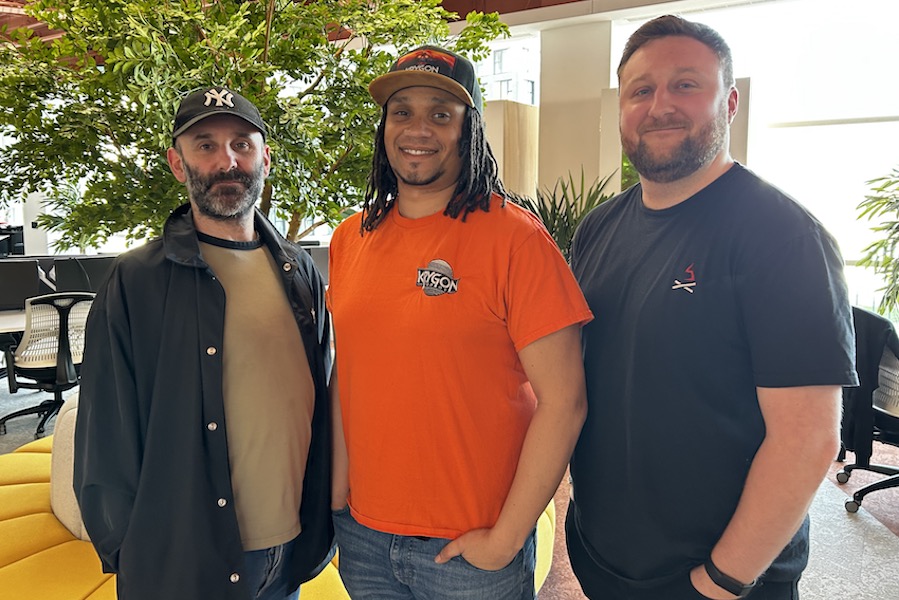“Manchester has an incredible musical energy” Jonny Greenwood chats ahead of Steve Reich celebration
- Written by Thom Bamford
- Last updated 1 year ago
- City of Manchester, Community, Events, Featured

As a guitarist and composer celebrated for his innovative contributions to Radiohead’s groundbreaking sound, Jonny Greenwood has consistently pushed the boundaries of musical exploration.
And he’s heading to Manchester.
As part of three separate concerts, forming part of the Hallé’s new ‘The Hallé Presents …’ series will be performed at both The Bridgewater Hall and Hallé St Peter’s.
These collaborative events will see the Hallé joined by world-class artists Colin Currie, ‘the world’s finest and most daring percussionist’ (The Spectator), and Radiohead’s Jonny Greenwood, as well as young musicians from the Royal Northern College of Music and Chetham’s School of Music.
The concerts feature over ten major works, including some of Reich’s larger-scale masterpieces such as The Desert Music, and Four Sections.
Iconic smaller works include Music for Pieces of Wood and Mallet Quartet, written for percussionist Colin Currie who performed it at two consecutive sold-out concerts in the Queen Elizabeth Hall, London.
We sat down with Jonny, who shared his insights into the upcoming Steve Reich celebration, a three-day extravaganza of contemporary classical music presented by the Hallé.
What initially drew you to Reich’s work, and how has your appreciation for his compositions evolved over the years?
A friend lent me his CD of Tehillim, and I loved it. Still have it. (I stole it – sorry!)
It’s songs/poems from the book of Psalms, and they sound simultaneously ancient and of the future – I couldn’t believe it was just voices and acoustic instruments, there appears to be electronic delays, and sequenced rhythms – but it’s just all in how he’s scored the music.
“Radio Rewrite” is a unique composition of re-worked Radiohead songs. How did you feel when you first heard about this project?
It was very flattering that he felt there was something in there to inspire him.
It’s like a remix, but done with pen and ink, which feels far more forward-thinking to me than most reinterpretations.
And really, there’s so much composition in there, it’s only a ghost of a few chords and melodies that remain – which is fine by me.
I guess composers in the past have found inspiration in popular folk music, and perhaps this is similar.
Steve Reich has such an extensive body of work. Are there specific compositions of his that hold a special place for you, either personally or musically, and why?
Music for 18 Musicians is something I’ve seen live many times, and it’s always fascinating.
When you just associate a piece of music with its recording, you miss so much. In a concert, you’re forced to confront the physicality of what’s going on – in that piece, it’s all muscles and effort and stamina – and great beauty – but all human-powered.
It’s so strange to me. The musicians move from one instrument to another, in the middle of the piece, and this sense of collective effort in the service of making music is very compelling to watch, and changed how I thought about the music.
As a guitarist and composer, you’ve demonstrated versatility in both classical and contemporary genres. How do you find a balance between your roles as a composer and a performer, especially in projects like the Steve Reich celebration?
I’ve only played a handful of ‘classical’ things – two by Steve Reich, and one by Messiaen – so I’m no performer really. But I love playing Electric Counterpoint: it’s a very joyful piece of music, for all that people are weirdly suspicious of that sentiment in contemporary music.
You’ve composed scores for films like “There Will Be Blood.” How has your experience in film composition influenced your approach to live performances of classical compositions, especially in the context of this Steve Reich celebration?
I don’t know that there’s been any influence: even when recording soundtracks, the best moments are when you get to go past the glass wall, and sit in the room with the players.
I’m less and less diverted by recorded music I think – or, more and more hungry for live, performed music that’s played and just disappears.
The reliable repeatability of recorded / programmed music feels safe and old fashioned to me, for all that notated music is meant to be dated.
Colin Currie, who is also performing at the festival said: “The connection of Steve’s music to the vibrancy and diversity of the Manchester cultural scene is particularly obvious and striking, and the presentation of this music in the optimum surroundings of The Bridgewater Hall and Hallé St Peter’s is most compelling.” Do you agree? What are your memories of performing in Manchester, and do you like the city?
Manchester has an energy most UK cities lack – and an understandable sense of pride in the music that’s come from there.
Also, there’s real hunger for new music in Manchester: I played with the London Contemporary Orchestra at the Albert Hall a few years ago, and it was one of my favourite ever musical experiences.
A great room, and such a buzz from the audience.
If you had to pitch this gig to someone who’d never heard Steve Reich’s music, what would you say to them to entice them to come?
I’d say – even if you think you know what his music sounds like, you don’t.
Recordings are rubbish, and so are your speakers.
Come and see how it’s really made – and see as much live music as you can.
String quartets, student groups, organ concerts, amateur choirs, anything.
Three separate concerts, forming part of the Hallé’s new ‘The Hallé Presents …’ series, will be performed at both Bridgewater Hall and Hallé St Peter’s.
These collaborative events will see the Hallé joined by world-class artists Colin Currie, ‘the world’s finest and most daring percussionist’ (The Spectator), and Radiohead’s Jonny Greenwood, as well as young musicians from the Royal Northern College of Music and Chetham’s School of Music.
You can find out the full listings here
Unfortunately, Jonny Greenwood’s event is sold out, but you can still get tickets to ‘The Desert Music on Thursday 1 Feb, which will be equally as fabulous.
You can grab tickets to this wonderful event by clicking here
- This article was last updated 1 year ago.
- It was first published on 22 January 2024 and is subject to be updated from time to time. Please refresh or return to see the latest version.
Did we miss something? Let us know: press@ilovemanchester.com
Want to be the first to receive all the latest news stories, what’s on and events from the heart of Manchester? Sign up here.
Manchester is a successful city, but many people suffer. I Love Manchester helps raise awareness and funds to help improve the lives and prospects of people across Greater Manchester – and we can’t do it without your help. So please support us with what you can so we can continue to spread the love. Thank you in advance!
An email you’ll love. Subscribe to our newsletter to get the latest news stories delivered direct to your inbox.
Got a story worth sharing?
What’s the story? We are all ears when it comes to positive news and inspiring stories. You can send story ideas to press@ilovemanchester.com
While we can’t guarantee to publish everything, we will always consider any enquiry or idea that promotes:
- Independent new openings
- Human interest
- Not-for-profit organisations
- Community Interest Companies (CiCs) and projects
- Charities and charitable initiatives
- Affordability and offers saving people over 20%
For anything else, don’t hesitate to get in touch with us about advertorials (from £350+VAT) and advertising opportunities: advertise@ilovemanchester.com

Here’s how you can make your moves matter for dementia awareness

£14.5m cultural and creative hub to ‘mark a new chapter’ for Stockport Town Centre

Now you can own a piece of TV history and support a much loved NHS Charity

Best bars and pubs to watch the football and live sport in Manchester

Discotheque Royale vs Piccadilly 21s: which was your favourite 90s Manchester club?
















